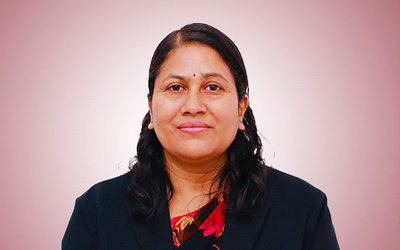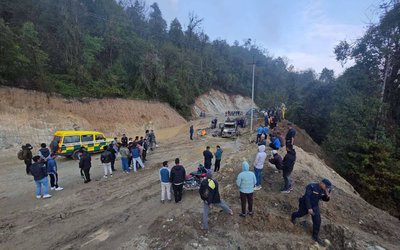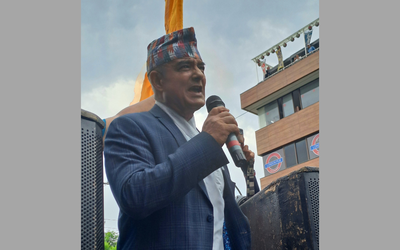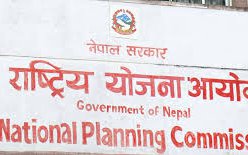
Dr. Sundeep Waslekar, President of Strategic Foresight Group, said water has been playing a very significant role in the recent conflict in a different part of the world.
He said that weaponization of water by armed non-state actors coupled with the complex geopolitical situation in the region only serves to enforce water as a multiplier of the conflict in the Middle East. He added that ISIS took control of several dams in the region such as Tabqa, Mosul, and Hadida dams in order to gain a strong foothold in the region.
From the use of water to the importance of water, the two days workshop discussed the water and its coverage globally. Participated by journalists and experts, several agenda came out during the workshop.
Dipak Gyawali, former Minister of Water Resources of Nepal, addressed the inaugural program of the workshop highlighting the use of water and its importance.
Ilmas Futehally, Executive Director of Strategic Foresight Group, said that this workshop aimed to discuss how to make water as an issue of importance at the media sector. She also said that sharing experience and knowledge among high-level journalists from different age group is highly significant.

From Lebanon to Syria and Turkey to Colombia, Nepal and India and African water crisis, speakers highlighted the problems and importance of water.
Dr. Marwa Osman, Anchor and Producer at Press TV, Lebanon highlighted how contamination of water in Litani River affecting the life of people who are suffering from cancer. She highlighted who live along the banks of the Litani River in the Bekaa Valley citing that as many as 600 people have been detected with cancer in one town.
She said that the Euphrates basin is emerging as the theater of war between the SDF, US forces and Turkish troops. Any solution to the crisis in Syria will have to take developments in the Euphrates basin into consideration.
Co-hosted by Strategic Foresight Group and Publicize With support from the Swiss Agency for Development and Cooperation An international workshop including an inter-generational dialogue of media leaders was convened by Strategic Foresight Group and Publicize, with support from the Swiss Agency for Development and Cooperation.
Attended by both senior media leaders and young journalists from all continents including North America, South America, Europe, Africa, Middle East and Asia, the objective of the workshop was to sensitize the media on global challenges of water and peace and introduce Blue Peace as well as key recommendations of the Global High Level Panel on Water and Peace with a view to enable the media to cover water and peace linkages in an effective way.
Some of the participants have been associated with Time Magazine, BBC, The Economist, Forbes, New York Times, Le Monde diplomatique, Politico, France 24, National Geographic, Daily Sabah, AlEtejah English Channel, The Atlantic, Mongabay, and Ooska News among others.
During the workshop participants discussed changing Nature of Media Newsrooms are shrinking along with the financial resources to cover issues relating to environment and water. A majority of news on the water is focused on stories that create fear such as tsunamis and earthquakes against which people want to safeguard themselves against.
They also discussed how several media houses have shut down their environmental desks after the recession. This has created a vacuum in environmental reporting which is gradually being filled in by freelance journalists. Freelance journalists have begun re-shaping the business model on reporting environmental issues. They have overcome the issue of fatigue which comes with reporting on climate change issues by endeavoring to have more focused reporting on specific topics. They are also able to visit places and meet people that would have been more difficult for a journalist reporting on more general issues to do.
Gloria Dickie, National Geographic Explorer and Contributor to the Guardian, Vice and The Atlantic, Canada explained the challenges Faced by Freelancers One major problem which emerged from the discussion on freelance reporting on water issues was that in order to discuss water as a standalone issue, most freelancers have to begin by zooming out and focusing on broader environmental issues and then re-focusing on water-related news.
She argued that tropical forests and oceans were given considerable more coverage over other issues like freshwater resources like rivers and lakes, because of the huge global movements that have emerged about these issues. Big challenges also arise in terms of funding, especially for work trips abroad. Also, the issue of using stringers to get local stories from developing countries is problematic. Moreover, sometimes is a threat to the life of fixers, stringers, interpreters, and journalists while reporting on water-related projects which have vested interests from narco-groups and non-state actors. Stringers can also be politically pressurized and may face a threat to life if their identity is revealed.

The participants argued that freelancers may not always be able to rely completely on the stories they gather from stringers. There are nationalistic views on water, which are difficult to ignore for freelance journalists. In several developing countries, there is active government interference while reporting on transboundary water issues; journalists are told what to ask and what to leave out. There is also the threat of lawsuits which can be imposed on journalists reporting on environment and water-related issues. For instance, when a journalist took pictures of the pollution in Litani River, a lawsuit was filed against him because such pictures supposedly ‘threatened’ tourism.
As news portals become increasingly web-based, vitriolic online comments on social media become another challenge faced by journalists. Citizen journalism poses its own set of pros and cons for freelancers and the media- it can be of hindrance to regular freelancers who coordinate with stringers to report on issues and at the same time, it can be a way to collaborate with staff correspondents of newspapers to report on local news.
The participants unanimously agreed that the media can be an important instrument of change. In recent times, with the abundance of new technology and multimedia has helped to narrate stories more effectively. Since water is a global issue, it becomes all the more imperative to tell stories related to water resources more imaginatively and there should be a great deal of re-thinking on the story-telling model. The integration of audio, video, text, and graphics is what makes a story more holistic and compelling for readers. Additionally, it also becomes imperative that there should be ‘accountable’ journalism rather than ‘access’ journalism in order to counter the rising trend of fake news.

Indrajit Gupta, Co-founder, and Director, Founding Fuel, former editor of Forbes and The Economic Times, India said that the air and water have no boundaries; populations living outside the forests suffer from pollution as well.
He said that a focus on reporting on local issues relating to water, journalists can help to demonstrate that countries cooperating on water need not necessarily be confrontational. By reporting on stories of cooperation from the ground, the media can signify that if there is already a base for cooperation, countries can use this base to further strengthen cooperation at a higher level. Water will most certainly become the next hot button issue. In the future, the issues of utmost significance will be water quality and water availability.
A good way of dealing with these issues can include the ‘human element’ in order to tell an engaging story. Stories narrated in local languages and dialects coupled with actual visits to the site have a deep impact on the minds of readers. It is also crucial that the journalist is not a lone individual when it comes to reporting; the entire newsroom must be involved including editors, graphic artists, and others. It is also important for journalists to have a cross-fertilization of ideas and issues related to water by interacting with hydro political experts, water engineers, policymakers and scholars.
The best part about reporting on the water is that often images can do more than words. It was agreed that a great way to collaborate could be by creating an online portal wherein the participants can post audio, video and other multimedia to support and sustain the exercise undertaken by the workshop. The challenge to engage in imaginative ways to report on the water is going to be a critical issue in the near future.
Experiences from Different Regions The participants contributed their experiences of reporting on water-related issues from different regions of the world which led to an enriching discussion on the subject. In Nepal, if journalists report on mining and destruction of the environment, they are immediately termed as being ‘anti-development’. China’s strategic interest in building infrastructure projects in various South-East Asian countries was also discussed which inter alia include building dams on the Indus, a hydro-power station in Bangladesh and a port in Sri Lanka.
Stories related to water in Africa are enmeshed in headlines related to land grabbing and land acquisition. For instance, in Ethiopia, many companies acquire land close to Lake Tana and utilize its water for cultivation of flowers which are then shipped to Europe and other countries. Countries in Latin America have to deal with their own unique set of problems. The water issues are diverse and there is a wide disparity in access to water.
Mexico City sinks by 15 cm every year, so there is lots of coverage related to the evacuation of people. The future of water issues in the dry corridor of Honduras, Nicaragua, and Guatemala will also have to take into account the issue of migration. The principal economic activity in the trans-boundary Amazon River is mining and this 6 introduces mercury and other toxic chemicals into the waters of the Amazon. As a result, indigenous peoples suffer the most.
Cory Bennett, Deputy Editor, White House, and National Security-Politico, United States of America said that Water and its Links to Security In the Arctic region, there is a vast resource of minerals which has led to a race between different countries to make a claim on these resources.

He said that Russia has already begun muscle-flexing in the region - they have decided to build ports and have acquired 6 nuclear-powered ice breakers. The US has only two ice breakers, out of which only one is capable of breaking strenuous ice.
He said that the US, President Trump has increased the budget for such military bases. A number of countries such as France, Japan, China, US, Italy all have their military bases in Djibouti to counter piracy and secure maritime interests. In 2017, the US State Department released a report on water, wherein water was acknowledged as being a key component of national security. The report addressed the security angles related to water in broad and general terms and did not provide a comprehensive strategy to deal with the same.
The US and Russia have already begun to come into conflict in the Arctic and this is expected to increase as the melting of the sea ice exposes more resources and opens out sea-routes. The role of water with regard to military bases and security establishments will become more critical with the rise in sea-levels which will compel countries like the US to relocate or even shut down coastal bases.
A case in point being the Norfolk Virginia military base, the largest naval base in the US, which may have to shut down in the coming 25 years because of the rise in sea-levels. The US hasn’t given much thought to the crucial issue of rise in sea-levels and has been substituting strategic long term plans with interim plans by building piers.
Dr. Romain Mielcarek, Contributor to Le Monde Diplomatique, Radio France International and Bruxelles from France said that the water is used as a tool to meet logistical operations. In Mali, the French troops require 150 liters of water per day per soldier.

“Sophisticated techniques and aircraft are required to transport large quantities of water across the Sahelian desert. The French army also builds wells in Mali so that water cannot be used as a bargaining tool by non-state actors. The challenge is how water can be used to manage the population on the ground in order to make people more autonomous and make them less susceptible to being controlled by non-state actors. Secondly, water as the environment is used to put submarines and there is a potential that rebels could discreetly abuse water through the use of submarines in the future.”
He said that the water is used as a weapon by rebels who target and destroy water resources, control the flow of the river and poison wells to terrorize people. The question that arises in such situations is how to prevent water from being used as a weapon in conflicts - can it be done through diplomatic treaties or government policies? Fourthly, water also poses a risk for the military and commandos working in the battlefield. The French military school has collaborated with WWF in order to ensure officers are given training on how to respond to water-related threats. Fifthly, water is a threat. The difference between threat and risk is that a threat is deliberate whereas risk is incidental.
Joydeep Gupta, Editor, and South Asia Director, The Third Pole, India said that there are several heartening examples from the ground level in South Asia which display immense cooperation between cross-border communities. He said that there was a dispute over the flooding of the Pandai river which intersects the Chitwan National Park in Nepal and the Valmiki National Park in India. The water panchayats of the communities living across the river got together and built dykes in order to prevent flooding, which now operates at the level of the local governments. Whenever a flood occurred in the north bank of the Brahmaputra in Assam, the blame was immediately heaped onto Bhutan. It was on the initiative of the local people that Whatsapp messages were delivered whenever water was being released upstream, which not only saved livestock but also enabled people downstream in India to get to safety.
He said that the cross-border residents of the Karnali River which flow through Nepal and India have initiated an early warning system through WhatsApp in order to mitigate the loss of agricultural crops. Another example is that of the Koshi River which has had a long history of floods, wherein women self-help groups get together to decide cropping patterns and the means to intimate their family if there is a flood. Additionally, communities along the Indo-Bangladesh border worked together on projects to re-populate the rivers with Hilsa fish. Such stories have been covered by the local media but not big publishing houses and the sources for such stories came from local stringers and staff 9 correspondents.

Mehmet Celik, Managing Editor at Daily Sabah, Turkey said that the local media has played a major role in enabling local civil society groups to promote problem-solving interaction between upper riparian and lower riparian regions.
He said that the media played a very positive role in supporting the Tigris Consensus, an initiative for cooperation and confidence-building on Tigris River between Iraq and Turkey, which began with exchanges between experts and eventually involved political leaders and government representatives. He said that the initiative was steered by the Strategic Foresight Group and Swiss Agency for Development and Cooperation.
Expressing the views Dr. Dwarika Nath Dhungel, former Water Resources Secretary of Nepal expressed the views from Nepal Since 2015 and highlighted how Nepal has adopted the federal structure of government and is already experiencing fights between the provinces over water.

Devraj Dahal, former Associate Professor of Political Science at Tribhuvan University and columnist, said that the main challenge for Nepal remains to manage its internal conflicts related to water. He said that Nepal is also among the first countries to start a community radio station which reports on all local issues including water issues and is extremely popular.
Yubaraj Ghimire, the editor of Deshsanchar, said that trans-boundary water issues are an interesting subject matter for the media, what matters most is what happens with water at the micro-level. Participants also raised questions such as water supply available to all villagers assumes greater significance as compared to the manner in which the Ganges River is managed.
Additionally, there is a definitive limit to the overuse of natural resources including water resources. It is not just climate change which has led to a decrease in water resources, but there are also drivers such as the misuse of technology, change in social mores, migration, etc. which have led to wrong policies being formulated to tackle environmental crisis. It is here that journalism can play its role to highlight such issues and engage with stakeholders to deal with such issues.

Chhatra Karki, News Editor, Nepal News, and Founding President of Nepal Forum of Science Journalists and Keshab Poudel, Editor of New Spotlight also participated in the program.
Anumita Raj, Senior Program Manager of Strategic Foresight Group also spoke the importance of the program.
Other journalists included Andrew Wight, Contributor to NBC, Nature and Daily Telegraph, Australia , David Duncan, Founder and CEO of Ooska News, United Kingdom , Fredrick Mugira, National Geographic Storytelling Explorer, Pulitzer Centre Grantee, Cofounder of InfoNile.org and Head of Water Journalists Africa, Uganda, Geoffrey Payne, International Adviser, The World Bank, United Kingdom, James Glade, Principal, Publicize/ESPACIO Media Incubator and Contributor to Rolling Stone, Tech Crunch, and The Atlantic, United States of America, James Robert Parsons, Chief Foreign Editor, France 24 TV, France, John Andrews, Author and former editor and foreign correspondent for The Economist, Contributor to Project Syndicate, United Kingdom, Michael Stang, Senior Author at Deutschlandfunk, Germany.
Similarly, Patrick Quinn, Principal, ESPACIO Media Incubator and Contributor to the Bogota Post and The Sociable, Colombia, Rita Payne, President Emeritus of the Commonwealth Journalists Association, former Asia Editor of BBC World, United Kingdom, Taran Volckhausen, Contributor to National Geographic, Christian Science Monitor and Mongabay, United States of America and Zoher Abdoolcarim, former Asia Editor of Time Magazine, Hong Kong. Jayantika Kutty, Research Analyst, Strategic Foresight Group, also participated in the workshop.


- KOICA Concludes Integrated Rural Development Project Worth 4.7 Million USD
- Apr 25, 2025
- Budget session Of Federal Parliament Begins Today
- Apr 25, 2025
- 10th Memorial Day Of Gorkha Earthquake
- Apr 25, 2025
- Kathmandu's Maximum Temperature Likely To Dip From Sunday
- Apr 25, 2025
- Budget Session Of Federal Parliament Commencing On Friday
- Apr 24, 2025















